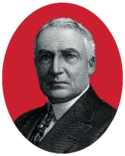1920 Republican National Convention
|
1920 presidential election |
|
 
Nominees
Harding and Coolidge |
|
| Convention | |
|---|---|
| Date(s) | June 8–12, 1920 |
| City | Chicago, Illinois |
| Venue | Chicago Coliseum |
| Candidates | |
| Presidential nominee |
Warren G. Harding of Ohio |
| Vice Presidential nominee |
Calvin Coolidge of Massachusetts |
The 1920 National Convention of the Republican Party of the United States nominated Ohio Senator Warren G. Harding for President and Massachusetts Governor Calvin Coolidge for Vice President. The convention was held in Chicago, Illinois, at the Chicago Coliseum from June 8 to June 12, 1920.
Many Republicans sought the nomination, including General Leonard Wood, Illinois Governor Frank Lowden and California Senator Hiram Johnson. Dark horse Harding was nominated at the convention, however. Many wanted to nominate Wisconsin Senator Irvine L. Lenroot for Vice President, but Coolidge was nominated instead, because he was known for his response to the Boston Police Strike in 1919.
The convention also adopted a platform opposed to the accession of the United States to the League of Nations. The plank was carefully drawn up by Henry Cabot Lodge to appease opponents of the League such as Johnson, while still allowing for eventual American entry into the League.
At the start of the convention, the race was wide open. General Leonard Wood, Illinois Governor Frank Lowden, and California Senator Hiram Johnson were considered the three most likely, nominees. Ohio Senator Warren G. Harding had been a front-runner, but his star had faded by the time of the convention. Many expected a dark horse to be chosen, such as Pennsylvania Governor William Cameron Sproul, Pennsylvania Senator Philander C. Knox, Kansas Governor Henry Justin Allen, Massachusetts Senator Henry Cabot Lodge, or 1916 nominee Charles Evans Hughes. Sproul in particular had been gaining momentum at the expense of Lowden, the candidate of the conservative wing of the party. The issue of joining the League of Nations took center stage at the convention, with some speculating that Johnson would bolt the party if the platform endorsed the League. The convention adjourned for the night after four ballots produced no clear leader, and many states stuck to favorite-son candidates.
...
Wikipedia
